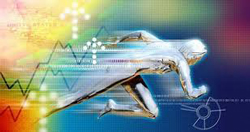ANALYTICS
SECTION ONE
SECTION TWO
Fast vs. Big: Who Will Win in the Future of Consumer Products?
By Paul Larson
We all love our gadgets. But perhaps the one thing we love more than those cool and fun
devices is getting them in our hands quickly.
If we look at our shopping habits for one minute, I doubt anyone can disagree how much we value fast delivery. Just the idea that I can find the item I want, finalize the order, and have it arrive at my doorstep in a matter of hours is nothing short of mind-blowing. In fact, according to PwC’s 2018 Global Consumer Insights Survey, 88 percent of consumers are willing to pay a premium for same-day or faster delivery.
While retailers are innovating new ways to deliver on the promise of speed, consumer products companies are finding that they also need to operate just as fast. After decades of scaling operations to make the customer experience incrementally better, the industry as a whole is beginning to shift that mindset. But it’s not about making big changes. It’s about how fast they can make it happen.
Fast Beats Big Every Time
Whenever consumers get used to things being fast, speed becomes the norm in how our world works. And consumer products companies are starting to notice as they find new opportunities to connect with consumers on a personal level.
There have always been retailers that are keenly connected with the consumer, taking on a massive part of the whole consumer products ecosystem. But now, consumer products companies are trying to take control of that relationship by interacting directly with consumers to better understand what potential buyers want and meet those needs in the moment of opportunity.
This is where fast can turn into a tremendously profitable opportunity in this fast, agile marketplace. Whether consumer insights are discovered and acted on throughout a long buying journey or the purchase is made on a whim, consumer products companies want to connect with the consumer at that moment. This approach empowers them to not only offer relevant promotions or recommend add-on products, but, more importantly, enrich the experience for the consumer as well as the business and its retailer.
Elements of Competing on Fast
Most consumer products companies have been making small changes here and there to give consumers a better experience than the last transaction. However, many businesses still tell me that they feel their processes and operations are too cumbersome and complex to keep pace with the ever-accelerating consumer journey.
How can they ever compete on “fast”? Really, like most things in life, a competitive advantage based on speed is an equation of three components that, when brought together, equal the desired result:
1. Simplify financial transactions: Harmonizing your whole financial infrastructure, while driving automation, eliminates most manual processes internally to increase visibility across the entire business. This allows seamless collaboration with customers and partners.
2. Standardize operations: By empowering your business leaders to support governance, your processes contain fewer variances and exceptions across the enterprise, which drives business intelligence.
3. Automate everything to enable the “intelligent enterprise”: To automate transactions, consumer products companies must integrate the entire ecosystem into a common platform that serves as the digital core of business intelligence. This digital strategy eliminates manual work to help ensure the company runs as one business, which increases visibility into the needs and wants of the consumer and the business.
Fast Is the New Sweet Spot
Yes, fast does beat big. Reacting quicker to the needs of the consumer will ultimately drive consumer satisfaction, bring untapped revenue to the bottom line, and open up unrealized opportunities for innovation. But to make that happen, consumer products companies need simplification, standardization, and automation - not one or two of these elements, but all three.
Let’s face it: Scale is useful if you’re a big organization with a diverse range of brands, but it can get you only so far. Consumer products companies need to start acting fast and driving the agility to connect with your entire ecosystem to boost revenue and customer satisfaction.
Paul Larson is Senior Principal & Industry Advisor, Consumer Products, SAP
Click on the LinkedIn logo to join the new Shopper Technology Institute Discussion Group
SECTION THREE

